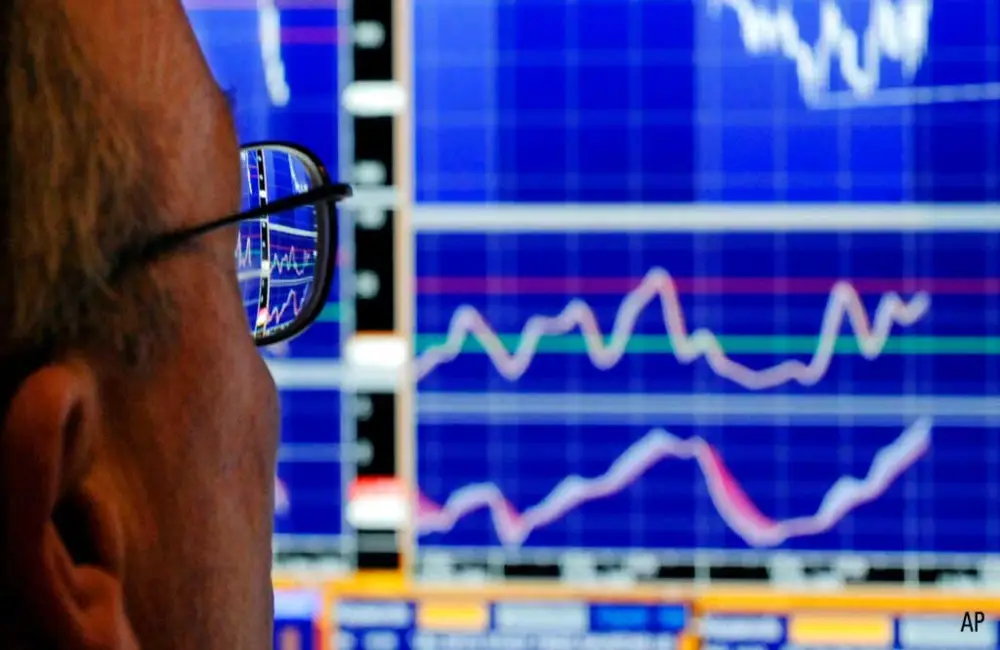ASX futures were 0.3% or 21 points lower as of 6:00am on Wednesday, indicating losses at the open.
US stock indices edged lower Tuesday, after fresh economic data suggested the labor market is slowing.
The S&P 500 and the Dow Jones Industrial Average fell 0.6% while the Nasdaq Composite shed 0.5%.
The health of the economy, and the resulting future path of interest rates, remains a key focus for investors. Job openings fell to 9.9 million in February, the lowest since 2021, down sharply from January's downwardly revised 10.6 million, the Labor Department said Tuesday.
In commodity markets, Brent crude oil was off by 0.2% at $US84.78 a barrel while gold gained 1.9% to US$2,021.57.
Australian government bonds were lower, with the 2 Year yield decreasing to 2.90% and the 10 Year yield dipping to 3.26%. US Treasury notes also lost, with the 2 Year yield down to 3.84% and the 10 Year yield slipping to 3.34%.
The Australian dollar declined to 67.40 US cents from its previous close of 67.84. The Wall Street Journal Dollar Index, which tracks the US dollar against 16 other currencies, edged down to 95.51.
Asia
Chinese shares ended the session mixed. The benchmark Shanghai Composite Index was the only gainer, rising 0.5% to 3312.56. The Shenzhen Composite Index fell 0.45% while the ChiNext Price Index lost 0.8%. Precious metal miners were among the top performers, after gold prices hit a multi-month high overnight on risk-averse sentiment amid the banking sector turmoil. Zhongjin Gold jumped 6.7% and Shandong Gold-Mining was up by 5.3%. But their gains were weighed down by weakness in battery metals, which have suffered steep price drops in recent months as investors dial back EV sales expectations. Zhejiang Huayou Cobalt shed 2.45% and Tianqi lithium declined 3.4%.
Hong Kong's benchmark Hang Seng Index ended 0.7% lower at 20274.59 as weaker-than-expected Caixin manufacturing PMI data for March weighed on investor sentiment. Shares of tech companies fell, with some big names retreating after a recent run of gains. Meituan dropped 4.4%, Alibaba lost 3.0% and JD.com fell 2.0%. Chinese EV makers also dragged on the market. Shares of XPeng and Nio slid 6.5% and 7.6%, respectively. The rise in oil prices since OPEC+ countries announced production cuts has boosted shares of energy companies. Cnooc rose 3.0% and PetroChina added 2.1%.
Japanese stocks ended higher, led by gains in energy and shipping shares following a sharp hike in crude oil prices overnight. Electronics stocks weighed on the market. Inpex gained 1.3% and Nippon Yusen advanced 3.6% while Renesas Electronics fell 2.4%. The Nikkei Stock Average rose 0.4% to 28287.42.
The Bombay Stock Exchange of India was closed Tuesday to celebrate Mahavir Jayanti.
Europe
European stocks traded mixed as investors digested weaker US economic data. The pan-European Stoxx Europe 600 and the French CAC 40 closed flat while the German DAX edged up 0.1%.
Data from the US showed factory orders and job openings declined in February. The data might have been expected to boost stocks on hopes of the Federal Reserve taking a more cautious stance at upcoming meetings, IG analyst Chris Beauchamp wrote. "But for the moment it looks like stocks have come too far, too fast to push much higher in the near-term."
The United Kingdom’s FTSE 100 lost 0.5% as investors joined Wall Street's more cautious tone and the pound hit a nine-month high against the US dollar, weighing on the blue-chip index's overseas earners. "Today's resilience in the pound does appear to be acting as a bit of a drag on the wider UK market, which has slipped into negative territory, with basic resources, energy and industrials acting as the main drags, giving back some of yesterday's gains," said CMC Markets analyst Michael Hewson.
North America
US stock indices edged lower Tuesday, after fresh economic data suggested the labor market is slowing.
The S&P 500 and the Dow Jones Industrial Average fell 0.6% while the Nasdaq Composite shed 0.5%.
The health of the economy, and the resulting future path of interest rates, remains a key focus for investors. Job openings fell to 9.9 million in February, the lowest since 2021, down sharply from January's downwardly revised 10.6 million, the Labor Department said Tuesday.
That came after data released on Monday showed that manufacturing activity declined for a fifth consecutive month. Hiring data for March is expected Friday, which will give investors more information on the labor market's health.
"That drop in job openings is suggesting a cooling off even before any tightening credit conditions from banking stress," said Jake Remley, senior portfolio manager at Income Research and Management.
US stocks have started April quietly, after a tumultuous first quarter. Major indices held strong in the face of a banking crisis that caught the financial world by surprise in March. All three major stock indices finished the first three months of the year with gains, despite a major selloff in bank shares and highly volatile bond market trading.
"We've been through a very significant inflation period, and we have followed that with a significant rate hike period," said Jason Pride, chief investment officer of private wealth at Glenmede. "Historically speaking, that hasn't been very good for the economy."
"We are in wait-and-see mode in terms of how the economy plays out," said Brian O'Reilly, head of market strategy at Mediolanum International Funds. “Higher interest rates are beginning to take their toll on the economy,” he added. "We are not waving the white flag just yet, but there are enough issues out there that we are relatively cautious."
Shares of Virgin Orbit slumped 23.2% after Richard Branson's satellite-launching company filed for bankruptcy and said it was working to sell itself. AMC Entertainment shares fell 23.5%, after the movie theater operator said it would settle a lawsuit brought by shareholders.























